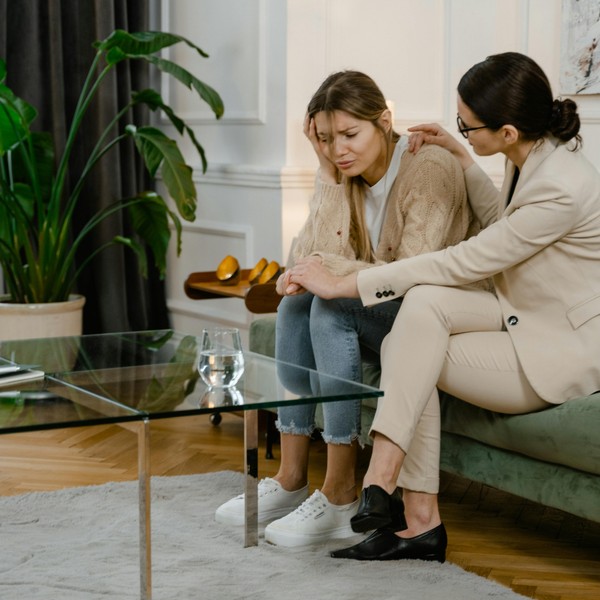Say goodbye to sleepiness and burnout for good!
I Tried 7 Different Types Of “Rest” & I’ve Never Felt Better
Staff Writer, Jasmine Williams, covers a variety of topics from home decor to beauty and everything in between. She has bylines at Motherly, The Everymom, and Byrdie where she wrote about motherhood, beauty, health and relationships. Jasmine knew she wanted to be a writer when she realized she was actually interested in reading the articles in her mom's favorite magazines — and she may or may not have ripped her favorite articles out to study them later. When she's not working, you can find Jasmine playing make-believe with her toddler, spending an undisclosed amount of time in Target or TJ Maxx, and searching for a family-friendly puppy to add to her family.
I'm a serial napper who loves getting as much sleep as I can, but last year shone a spotlight on how much sleepmaxxingwasn't helping me. Between fighting insomnia and waking up with my stress response on high alert, I knew I needed to make changes so grogginess wouldn't be my default mood.
Once I started asking myself a series of deep questions to see what I needed, I recognized why I wasn't feeling great. Not only were my sleeping habits terrible, I also wasn't thinking about other types of rest needed to function normally. With nothing but hope and time on my hands, I decided to conduct a 'rest' experiment to see if I could improve how I feel.
Based on my results — and the advice from licensed therapist Brooke Sprowl, LCSW of My LA Therapy — slow living feels good.
Scroll to see the 7 types of rest that can help you feel totally refreshed in 2025!

1. Physical Rest: Prioritizing physical rest led to a decreased need to be productive.
I inherited my parents' tendency to work on my days off because being idle felt like I was signaling how lazy I am. Instead of sleeping in on Saturdays, I'd wake up early to clean before cooking breakfast, planning activities for my son, and going over content creation ideas. Couch rotting wasn't allowed until I was absolutely done with everything, but there was always something to do.
The day I collapsed in my bedroom after rearranging the living room and my office was the moment I asked, "How did I decide working myself to pure exhaustion meant I was an amazing woman?" So, I gave myself permission to start using my weekends to rest. Sprowl says, "Physical rest includes both passive activities like sleep and active recovery practices like gentle stretching, yoga, or massage."
She also indicates collapsing was likely a sign my body's way of sending a huge flare to get my attention. "Listen to your body’s signals of fatigue and make rest a proactive priority rather than waiting for exhaustion to take over," she encourages.
For me, this looks like sleeping in past 10 a.m., stretching my body in the morning, and taking long showers. It's an act of resistance that's helped me unplug and reset after a long work week. Sprowl believes getting physical rest helps "restore the body's reserves, reduces stress hormones, and supports overall physical health," ultimately "laying the foundation for every other type of rest."

2. Mental Rest: Taking a mental break helped me unplug.
I'm a chronic over-thinker, so I'm still learning how to give my brain a break. However, tools I've picked up from therapy help along with reminders from my inner circle. Why does it matter? Sprowl says, "Mental rest is about giving your mind a break from overthinking, decision fatigue, or cognitive overload."
Besides unplugging from work, I have to remind myself to stay present by focusing on things that are in my vicinity. Sprowl says giving yourself a mental break may look similar or different. "This might mean stepping away from work, practicing mindfulness, or engaging in activities that allow your brain to wander, like walking in nature."
If you and I don't allow our brains to 'cool down,' she believes "it can lead to irritability and difficulty focusing" which explains the moments I barely had patience last year. Genuinely resting "fosters clarity and cognitive balance," according to Sprowl which is what we could use more of!

3. Emotional Rest: Treating my emotional health with care helped me embrace vulnerability.
The other area I struggle with sometimes is my emotional health. A physically and mentally exhausted Jasmine often leads to an emotionally unhinged version of myself that struggles to express what's wrong or things I need. "Emotional rest involves creating safe spaces to express feelings or allowing yourself to step back from emotional labor," Sprowl points out.
It matters because it can "ease racing thoughts and unresolved feelings that interfere with sleep," according to her. Prioritizing this kind of rest essentially creates "a sense of calm before bedtime" in her opinion. It can look like "journaling, talking to a trusted friend, or working with a therapist" to "help unburden accumulated emotions."
If I'm not gratitude journaling, I'm usually talking to one of my best friends or fiancé about anything I may be struggling with. Being vulnerable with people who care about me has helped calm my sea of emotions, creating a level of comfort I haven't felt in years.

4. Social Rest: Reaffirming my need for social breaks stopped making me feel weird.
This is a safe space, right? My daily confession is that I've always prioritized social rest. I didn't have a name for it when I was younger, but I've been able to feel when my social battery is depleted which leads me to find a way to reset alone. I almost lost my ability to do so when social media was popularized, but the past couple of weeks have reminded me to take steps back so I'm not internalizing different opinions and emotions.
Sprowl says, "Social rest combats the overstimulation and comparison often fueled by digital platforms, helping you reconnect with yourself." It's hard for me to hear myself when I'm thinking about what everyone else is saying so I'll put on my phone on DND (do not disturb) or set screen limits for various apps.
It's something Sprowl feels is vital. "Social rest means setting boundaries around social interactions, particularly with relationships that drain rather than nourish." Like I've been doing, she further says "limiting time on social media, scheduling solo time, or prioritizing relationships where you feel truly seen and supported" are some of the ways you can also hit the reset button.

5. Spiritual Rest: Tapping into spiritual rest helped me feel less afraid.
I don't mind talking about my religious background, but I understand not everyone shares the same beliefs I do. Still, I'm a firm believer that we need to prioritize spiritual rest in a world that's in hustle mode. Sprowl says this "nurtures the soul, creating a sense of peace and alignment with your values." She believes "connecting to something greater than yourself" can help add to the physical, emotional, mental, and social ways we may need to hit pause.
I personally love to pray, read devotionals, or use my journal to reflect about various things. Other things Sprowl suggests doing are mediating, grounding yourself in nature, or adopting a gratitude practice. Whatever you choose to do, she feels "it's about finding purpose and meaning in your life."

6. Creative Rest: Creative breaks made me feel less irritated by what I love to do.
Fellow creatives, are we okay? It seems like the very thing we love to do — creating art — can leave us feeling drained which is confusing. But I've got a secret as someone whose dream career is a reality: we have to stop and take breaks from creating sometimes. Please don't throw tomatoes! I'm serous here.
Sprowl says, "For those who thrive on innovation, creative rest involves stepping back from the pressure to produce and immersing yourself in inspiration." See? I'm not just making this up! Just like the social rest I've become a pro at, I've learned how to go on little adventures around my neighborhood, discover new food places to eat, or get lost in one of my music playlists.
Sprowl says you too can "visit an art gallery, listen to music, read poetry, watch an artful movie or show, or simply allow yourself to enjoy beauty without the expectation of creating." Being in the moment "replenishes the well of inspiration" us creatives pull from, thus "preventing burnout and keeping creative pursuits joyful," according to her.

7. Sensory Rest: Getting real about sensory overload stopped me from being irritable.
Sensory overload is real! I'm extremely quick to tell my fiancé, "Honey, I'm feeling overstimulated and need a break" which he knows means I have about 5-10 minutes before my irritability says, "Peek-a-boo!" Becoming a mom made me more aware of how much adults can't always tell when there's too much going on for our liking so I've worked hard to be more aware.
If I can't stand being touched after a while or need the TV's volume lowered, it's a sign that I've been dealing with them for too long. Sprowl says, "Sensory rest requires reducing stimuli like bright screens, loud environments, or excessive multitasking. Consider dimming lights in the evening, unplugging from devices, or practicing sensory mindfulness, like focusing on a single sound or texture."
My favorite thing to do is take a hot shower in the dark sometimes. My fiancé thought it was strange the first time I did it, but now he knows it's something I need. Other things I'll do is sit on my office's floor and journal by myself. It's a nice way to tap into my inner calm instead of getting overly upset.
"In our overstimulating world, sensory rest calms the nervous system and helps prevent overwhelm," says Sprowl.
Focusing on 7 types of rest sounds like a lot, but it's not when you consider how many things can raise our cortisol levels. From internal to external irritants, we're constantly being bombarded with things that can cause pure exhaustion. It just makes more sense to me to prioritize self-care that doesn't always involve spending money.
Subscribe to our newsletter for more wellness tips!




















